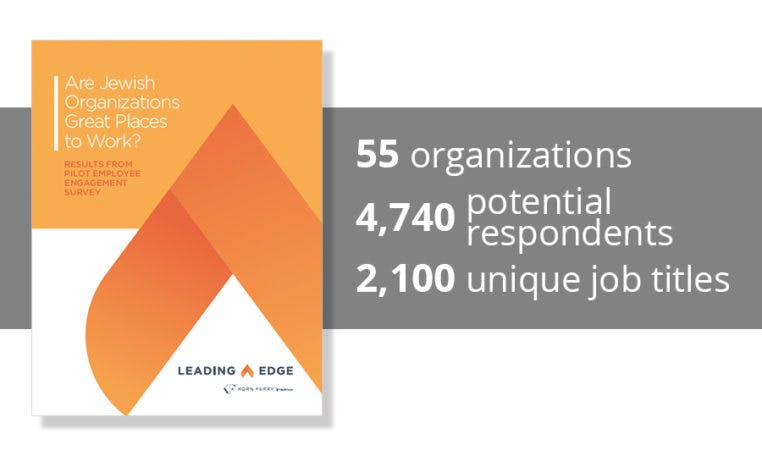
Are Jewish Organizations Great Places to Work?
Within the next five to seven years, 75 to 90 percent of Jewish nonprofit organizations will be faced with the daunting challenge of replacing their retiring CEOs and senior leaders. The key to filling these spots with highly qualified individuals is a strong pipeline that leads to the top.
But with organizations already struggling to attract and retain talent, we have to ask ourselves: Are Jewish nonprofits great places to work? If not, how do we change course? And if so, how might these already great places become even better?
Let’s start with what we know. Great places to work actively support staff members to do their very best. Effective organizations hone employees’ skills, strengths, and interests, thus maximizing their potential. Studies show that a strategic approach to talent management and an overall commitment to workplace culture have clear benefits, namely a greater level of employee engagement that leads to a significantly lower turnover rate, and higher productivity that better enables organizations to achieve their goals.
To assess where Jewish organizations fall on the spectrum of great workplaces, Leading Edge recently partnered with Korn Ferry Hay Group, a global leader in employee research, and conducted a groundbreaking pilot Employee Engagement Survey. A total of 3,422 employees responded from 55 organizations that range in size from a handful to hundreds of employees. This pilot group included federations, JCCs, foundations, religious movements, educational institutions, youth organizations, social justice groups, and social welfare organizations.
By analyzing responses to statements that gauge how engaged and empowered employees are to do their best work, we can begin to assess how “great” our organizations are and what we might do to help them become even better places to work. The survey provides baseline data for our field and paints a powerful picture of the strengths and opportunities facing our sector.
While the 55 organizations surveyed represent a diverse cross-section of our community, Leading Edge does not yet have enough data to say with certainty that these survey results perfectly mirror the entire Jewish nonprofit sector. However, our findings do offer a viable starting point for identifying possible levers that can help us create better workplaces.
To download the full results from Leading Edge’s Employee Engagement Survey, CLICK HERE.
Here are six key findings from the survey.
1. EMPLOYEES ARE MOTIVATED BY MISSION.
This is great news for the Jewish nonprofit sector! A whopping 86 percent of respondents – far more than in the general industry benchmark (which includes nonprofits and private sector companies) – feel connected to their workplace mission and understand how their work directly contributes to advancing this mission.
Sense of purpose is a key driver of employee engagement, and we have it in spades.
But a strong sense of purpose doesn’t necessarily lead to personal satisfaction in the workplace. The data also show that even employees who are driven by the mission are still a potential flight risk.
2. WE NEED BETTER MANAGEMENT PRACTICES.
Overall, many of the organizations that participated in the pilot survey do not have sufficient systems and practices in place to train new staff, provide feedback, or hold people accountable.
- Only 49 percent of respondents feel new employees receive the training they need to do their jobs well, compared to 60 percent in the general industry benchmark.
- Just 47 percent had a meaningful performance review in the last year, and 36 percent did not receive clear and direct feedback regarding how they do their work (similar results in the general industry benchmark).
- Even fewer – 41 percent – feel that poor performance is addressed effectively (compared to 57 percent in the general industry benchmark).
Contrast these findings with the fact that 88 percent of respondents feel respected and recognized in their workplaces – 10 points higher than the general industry benchmark. Note the interesting juxtaposition: While many managers fail to address poor performance, they succeed at helping employees feel recognized and cared for.
It seems we are good at saying yasher koach for a job well done but struggle with having honest, often difficult conversations when employees are not performing well. This is indicative of a workplace that functions like a family, rather than as an effective organization.
3. THERE IS AN ENGAGEMENT DIP.
Turns out it doesn’t take long for the mission-driven employees in our sector to grow frustrated. Within only a year on the job, employee engagement dips–a sophomore slump of sorts. After that first year, people tend to feel frustrated, as a result, their engagement dips, and many start looking elsewhere. Unfortunately, we have more frustrated employees than the general industry which includes a variety of organizations in different sectors. Frustrated employees are engaged and passionate, but not enabled to do their best work.
Fortunately, frustrated employees are the easiest to make effective. These employees will often thrive if organizations provide essential resources, prioritize training, regularly revisit work processes and manage performance, and address feelings of being overworked.
4. EMPLOYEES ARE STRETCHED THIN.
Most people, no matter where they work, want to be paid more. But we noticed an interesting and consistent trend among the employees we surveyed–people felt more strongly about having insufficient staff resources to accomplish their work than they did about their compensation.
A desire to keep overhead low is an obvious culprit, but this might also be a management issue. After all, effective managers help their teams prioritize and focus their efforts.
We also know that this work is not easy. People are passionate about making a difference and often work long, hard hours to have the impact they wish to achieve. So working efficiently is especially important in this sector.
5. WE LACK CLEAR CAREER ADVANCEMENT OPPORTUNITIES.
Only 52 percent of respondents see themselves staying in the Jewish nonprofit sector beyond five years. One-third don’t plan to work for their organization for more than two years. While compensation is a top-cited reason for why employees look elsewhere, nearly as many (more than 60 percent) cite insufficient opportunities for career advancement as the cause of their wanderlust.
While some survey respondents who intend to leave their organization or the sector will end up remaining, it is clear we need to do a better job of defining clear career paths for rising talent. Employees want to know what advancement opportunities exist so they can work towards them.
Among the 4,740 employees who were possible respondents, there were nearly 2,100 unique job titles. This fragmentation makes it difficult to navigate career opportunities in our sector. Compare this to other sectors where the career path is more clearly articulated, and employees know what skills and experience it takes to advance.
6. CONFIDENCE IN LEADERSHIP IS KEY TO RETENTION.
Those who plan to stay in our sector do so because they have confidence in their leaders.
These employees cite their leaders’ ability to create a culture of open communication and willingness to offer regular feedback on performance. Leaders who provide a clear and promising sense of organizational direction, and instill in their team a greater ability to contribute to the organization’s overall mission, end up with employees who feel more engaged and better enabled to do their best work.
Leadership matters. A lot.
Our Next Steps
Leading Edge has conducted one-on-one sessions with almost all of the organizations that participated in the survey, reviewing their results and helping them think through how they might build on their strengths and close the gaps in their weaknesses.
Over the coming months, we will explore how Leading Edge can further support the field, whether by creating tools, delivering trainings, or providing other resources to help organizations strengthen their workplace cultures. And, by expanding the survey to include other organizations who are interested in this kind of workplace audit. If you lead an organization and are interested in participating in the next round of this survey, let us know.
Organizational development is a process, not a destination. This process is about progress, not perfection. We look forward to continuing the journey of helping Jewish organizations become greater places to work.
To download the full results from Leading Edge’s Employee Engagement Survey, CLICK HERE.
About the Authors
Caren Yanis is the Outgoing President of the Crown Family Philanthropies, a Board Member of Leading Edge, and the Chair of the Leading Places to Work Task Force.
Jeffrey R. Solomon is the former President of the Andrea and Charles Bronfman Philanthropies, the Senior Advisor for Chasbro Investments, and the Chair of the Board of Leading Edge.
Loading footer...


